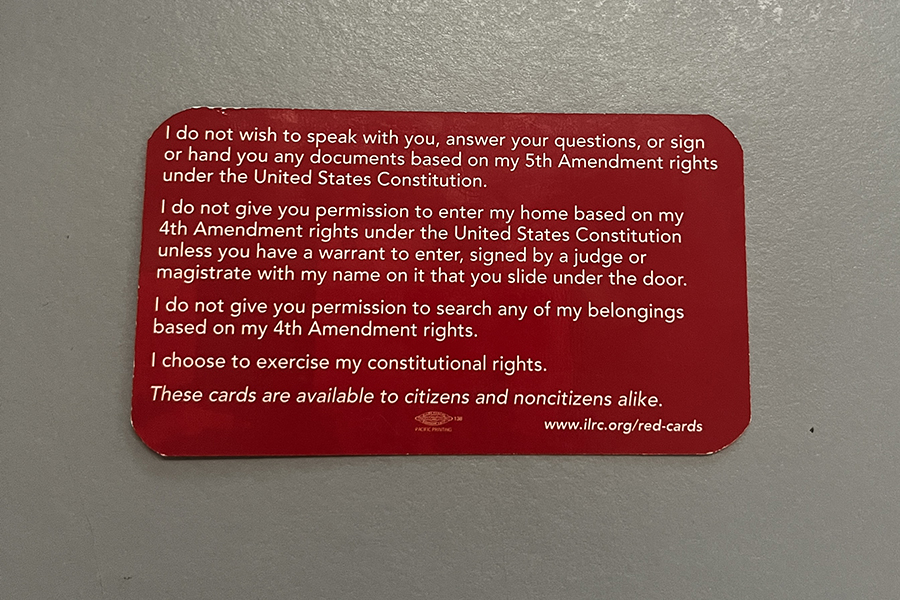Starting only days after he was sworn into office, President Trump began reenacting and reinforcing old immigration laws, allowing the U.S. Immigration and Customs Enforcement (ICE) to begin raids across the country. In his inaugural speech, he promised “all illegal entry will immediately be halted. And we will begin the process of returning millions and millions of criminal aliens back to the places from which they came.” He has since allowed ICE to raid public spaces like schools, churches, and hospitals, which had previously been illegal. All his actions against immigrants have been in the form of executive orders, some based on previous law.
The increase in deportations and raids has affected many American immigrants, whether they are here legally or not. Children, especially, are most vulnerable during this time, largely due to the ability of ICE to raid schools. Due to the speed of arrests and deportations, many have wondered what the constitutional rights of immigrants are, specifically involving children.
As of right now, immigrants hold the same constitutional rights as US citizens. This includes the rights to free speech, press, and protest, and Miranda Rights.
Knowing these rights is not only important for immigrants, but for all citizens. Kristin Clarens, an immigration attorney at legal aid who wrote this in her own capacity, believes that “we are lucky to live in a country that protects our rights to free speech and association–we can explore ideas, debate with our friends and classmates, and try out different groups and organizations without worrying about getting investigated. Everyone should know about these freedoms so that we understand how valuable they are to us individually and to our community collectively. The more we know about these rights, the more we’ll appreciate and protect them.”
Within Schools
In order for ICE to raid public places, like schools, they need an administrative warrant. This can be administered by ICE or a court, but only if they have probable cause to administer it. Often for ICE, probable cause means that they believe an immigrant is “removable,” which means they have evidence that the person is an immigrant and has been convicted of a crime. As well as probable cause, it must have an affidavit, which is a sworn statement that says that the information of the probable cause is truthful. Lauren MacLean, the assistant director of EL and world languages for ACPS, said that “per our superintendent’s statement, ‘students or their family members will not be questioned, detained, or taken into custody on ACPS premises except when a law enforcement officer presents a valid warrant for an arrest on criminal charges.’” This was affirmed by the county’s council, Josiah Black.
Furthermore, MacLean guaranteed that all student information and records are protected, though “all schools, including ACPS, do not ask students or families about their immigration status; this is not a part of student records,” she said.
Within Private Homes
To raid private homes or dwellings, ICE must have a judicial warrant. A judicial warrant is signed by a judge, and must be used within 14 days of it being issued. Those are two key details to look for when presented with the warrant: the signature of a judge, and the date. Judicial warrants must be complied with.
Different Statuses of Immigrants
-
- Naturalized citizen: a citizen with no conditions, requirements must be met, including living in the US for at least 3-5 years and passing multiple tests.
- Lawful Permanent Resident (green card holder): allows a non-citizen to live and work permanently in the US. The non-citizen must petition for this, and it can be revoked due to certain crimes. They have the same constitutional rights as citizens.
- Family Sponsored Immigrant Visa: non-citizen spouses, minor children, or parents are granted a family sponsored visa. They have the same constitutional rights as citizens.
- Refugee/Asylee: a person with well-founded fear of persecution due to their religion, race, nationality, or membership within a group. If their application for asylum is granted, they are allowed to reside in the US as long as returning to their home country is considered dangerous. Refugees have the same rights as citizens, as well as some humanitarian rights granted by international law.
- Student Visa Holder: people studying in the US with a student visa are not considered “immigrants,” as they are staying in the US for a set amount of time for a certain purpose. Similar to a student visa, a work visa may be issued to allow a foreigner to work in the US, and the limitations of that visa are often based on the employment. Both the visas can be revoked.
How to be an informed student
In order to stay informed, students should prioritize reading accurate, current news. “I do think that we’ve moved away from unbiased news, and that’s a problem,” said Padron. Finding trustworthy sources is the first step to staying informed.
As well as seeking out factual information, students should also be wary of information presented to them that could be fake. MacLean advised that “You also need to take care of yourself and consider both how and when you monitor current events; be judicious about consuming news from ethical sources and consider having a schedule for when you do. You don’t need to stop using social media, but when I see a news story on Instagram (I know, I’m old), I try to find the story and read it, rather than just the reaction.”




